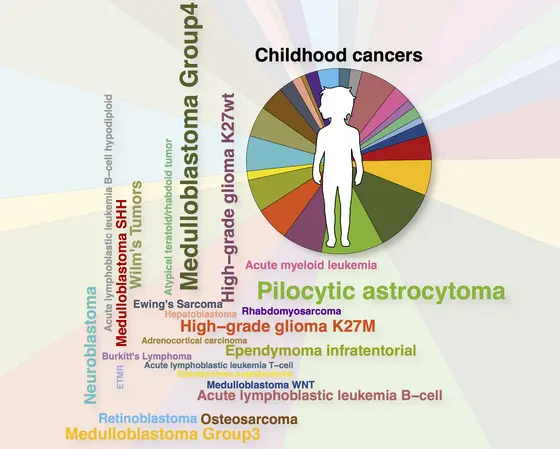Up to now, comprehensive molecular-genetic data analyses in pediatric oncology have been rare because patient numbers are comparatively small. However, they would be urgently needed in order to further improve the survival rates of children suffering from cancer. About 20 percent of the young patients still die from the disease. In addition, findings concerning cancer in adults cannot be translated readily to children and adolescents.
Charting the genetic repertoire of pediatric cancer
Heidelberg scientists from the KiTZ, in collaboration with colleagues from the DKFZ, DKTK, NCT and Heidelberg University Hospital as well as specialized research teams from the Society for Pediatric Oncology and Hematology (GPOH), have studied the genetic repertoire of childhood cancer. With the goal of identifying novel approaches for diagnosis and treatment of cancer in children, the investigators used the most advanced DNA sequencing technology and comprehensive data analysis to take a very close look at point mutations in DNA as well as larger structural changes in 961 tumors of 24 different types of cancer.
“It turned out in about half of the patients that genetic alterations affected cancer cells so that they are potential targets for so-called targeted anticancer drugs,“ said Marc Zapatka,, group leader of Bioinformatics at the Molecular Genetics Department of the DKFZ. Stefan Pfister, scientist at the DKFZ, attending physician at Heidelberg University Hospital and director of the preclinical program at KiTZ, added: “This is a very encouraging result because it means that we might already have agents that target these specific sites and, therefore, might be treatment options for the affected patients.“ Pfister continued: “Most of these drugs have not yet been tested for children. It remains to be seen whether they are also safe and effective in young patients.“
In approximately seven percent of all cases, the scientists found genomic alterations that are suspected to have played a role in the development of cancer in these patients. These so-called germline mutations can either be inherited from a parent or form at the very beginning of embryonic development and, therefore, are present in every single body cell of a patient. They are transmitted to the next generation of offspring. Patients with heritable forms of cancer need special attention, because they often need to be treated differently from patients with the same type of cancer who do not have a heritable predisposition.
“Compared to tumors in adults, the investigations revealed large variations in the type and incidence of mutated genes,“ said KiTZ associate Lukas Chavez, who worked as a group leader at DKFZ's Pediatric Neurooncology Department. “This confirms once more that tumor development proceeds in fundamentally different ways in children compared to adults,“ Pfister commented. “And it also shows us that we have to go about developing targeted therapies for children differently than for adults. In many cases, we may also need drugs that are specially developed for children.“
The data are freely available on www.pedpancan.com. Colleagues from St. Jude Children's Research Hospital in Memphis, USA, published further molecular data on childhood cancers along with the Heidelberg study in Nature. Data from both studies are available at St Jude PeCan portal (https://pecan.stjude.org/home). “The two studies, which were developed in close collaboration of all teams, complement each other and together almost entirely cover the molecular diversity of childhood cancers,“ explains Pfister. “We believe that the data are a valuable source for pediatric oncology research and can help to improve the cure rates for young cancer patients.“
The project has received major support from the German Cancer Consortium (DKTK), the German Cancer Aid (Deutsche Krebshilfe) and the German Childhood Cancer Foundation (Deutsche Kinderkrebsstiftung).
Original publications:
Gröbner et al. The landscape of genomic alterations across childhood cancers. In: NATURE, Online publication 28th February 2018; DOI: 10.1038/nature25480
Ma et al. Mutational Landscape of the Genomes and Transcriptomes of 1,699 Pediatric Cancers. Online publication 28th February 2018; DOI: 10.1038/nature25795
A picture is available for download:
PedPanCan_SGroebner_E.jpg
Picture Caption: The diversity of childhood cancers
Note on use of images related to press releases
Use is free of charge. The German Cancer Research Center (Deutsches Krebsforschungszentrum, DKFZ) permits one-time use in the context of reporting about the topic covered in the press release. Images have to be cited as follows: “Source: Susanne Gröbner, KiTZ“.
Distribution of images to third parties is not permitted unless prior consent has been obtained from DKFZ's Press Office (phone: ++49-(0)6221 42 2854, E-mail: presse@dkfz.de). Any commercial use is prohibited.



